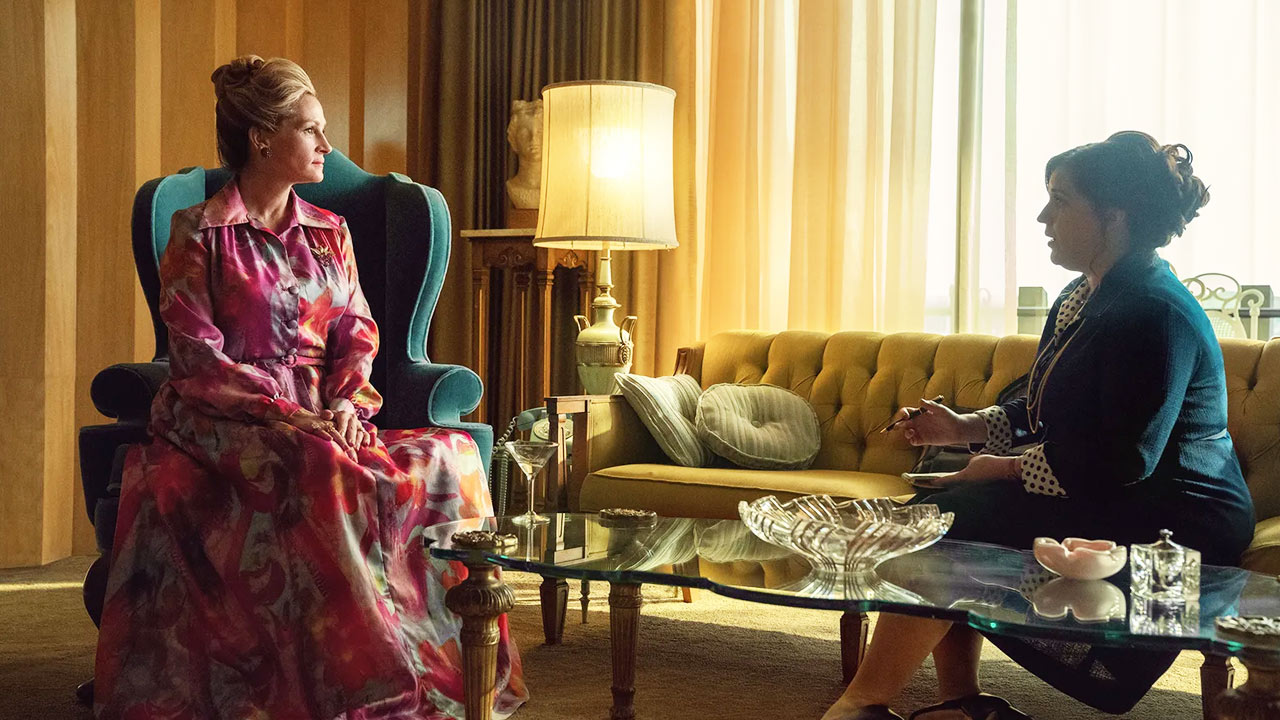So-so drama Gaslit stars a radiant Julia Roberts and a chin-dribbling Sean Penn
A prosthetics-enhanced Sean Penn is a sight to behold, sinking into all his new chins and stomach rolls.

Presenting a different take on the Watergate scandal, this eight-part series features head-turning performances from Julia Roberts and Sean Penn—who should have featured more prominently, writes Luke Buckmaster.
Words like “unrecognisable” and “virtually unrecognisable” are bandied around a lot in discussions of famous actors disguised by prosthetics and makeup. Most of the time you can still see the star clearly there: behind that fake snoz or underneath the fat suit. But Sean Penn in Gaslit—an eight-part series created by Robbie Pickering that revisits the well-flogged Watergate narrative from the perspectives of lesser-known players—really is completely unrecognisable, or about as close as you get, as Nixon’s Attorney General John Mitchell.
Like all conservatives during this era, Mitchell smokes a pipe, kvetches about beatniks and is, generally speaking, a bit of a dick. Like Gary Oldman in the Churchill biopic Darkest Hour, Penn dons not just a bald wig and a prosthetic nose but a prosthetic…everything, or so it seems, sinking into all those new chins and stomach rolls to deliver a surprisingly naturalistic performance. And yet despite Penn walking around in this hideous, post-human, Nixonian metamorphosis, it’s Julia Roberts who often steals the show as the star attraction.
For one thing you can actually see her, which tends to help re: star power. For another Roberts delivers one of those portrayals—of Mitchell’s wife Martha, the so-called “mouth of south”—that feels inseparable from the real-life subject, whose legacy will now be informed by the terms of the performance. It must have been an appealing part, with dialogue drawing out a silver-tongued, almost Bette Davis-ish frostiness, and numerous scenes of Martha swanning around soirees and social occasions, owning the room, and standing her ground during media interviews. Plus there’s the cachet in playing a figure of historical significance, who came out swinging against the then-President before his head rolled, and was subsequently pilloried by Nixon loyalists.
Before we meet her properly we see her on the teev, being watched by the kind of person the squares despised: a naked woman smoking a reefer. She’s in a hotel room with John Dean (Dan Stevens), an attorney who is serving as White House Counsel and is called to a meeting with Mitchell during which the idea for an “intelligence gathering” (ahem) exercise is proposed. Dean hoons there in his sweet ride, a Porsche, past police accosting bohemian types and an anti-Vietnam war rally.

These are early indications of the show’s historical and geographical context, reiterating what audiences probably knew before pressing play: that the series is based in Washington circa the 70s. The very first scene in episode one is far weirder, beaming in from another reality, with a tantalising staginess. This moment begins with a mega close-up of lawyer G. Gordon Liddy (Shea Whigham)—leader of the goons who broke into the Watergate Complex—discussing how history “isn’t written by the feeble masses, the pissants, the commies and the queers and the women” but instead by people in the corridors of power.
This rather intense fellow—an odd character to open with, given he’s under-developed in the show’s first five episodes (which form the extent of this review)—concludes by commenting on “what it means to be strong, what it means to be American” as the camera pulls out to reveal his left hand is outstretched, being held above the flame of a candle. It’s an arresting moment, if a wee bit gibberish-filled, arriving before we’ve had time to figure out the broader dramatic tone and context—which turns out to be a lot more sedate and sensible, if somewhat disorderly, than this preliminary moment implies.
The drama operates in big, slow movements, large cogwheels of plot turning with no rush to get to the bits with the cloak and dagger stuff. Martha’s reluctance to be stage-managed or subservient leads to her being placed in house arrest once the story of the scandal threatens to break, momentarily giving the show a domestic thriller vibe. Resolved not to revisit the expected narrative pivots, the action takes place to the side of (to take inspiration from its introductory visual metaphor) the white hot part of the flame. Gaslit comes across as rather fickle—tonally, in its genre-blending of comedy, polished drama and political thriller, and narratively, in its indecisiveness towards whose perspective through which it is ultimately framed.
Roberts and Penn are clearly the show’s best assets, yet it’s unwilling to fully commit and make them clear principal leads. Consequently our interest wanes and the plot momentum is frustratingly stop-start. Visually Gaslit‘s most interesting element is Penn’s spectacularly remade appearance—which, come to think of it, has a contradictory effect: you marvel at how greatly the actor has been made up, which brings attention to the transformation, which ushers the actor back into existence. Maybe he didn’t disappear after all.























